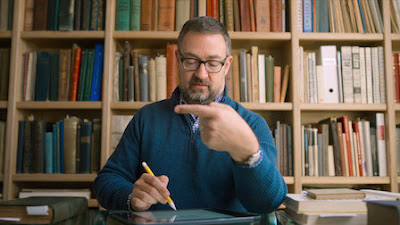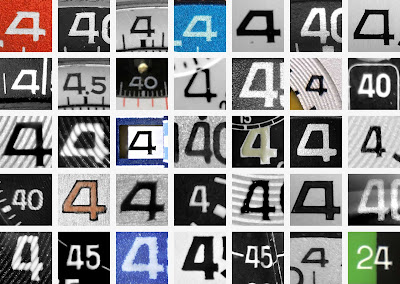This isn’t just a mock-up, this is a real TrueType font you can download. If you dare.
(But seriously, download it now in case there’s some copyright violation case that’s launched at this is taken down.)
Hat tip to Mike Nitabach.
Hey! Established researchers! Give your own poster presentations!
Seeing super-famous PIs presenting posters at Biology of Genomes was a formative moment for me.
That reminder of the importance of being “down in the trenches” from Michael Hoffman.
Coincidentally, a recent meeting at Cold Spring Harbor made senior researchers give posters. Dan Tracey gave this poster:
Dan wrote
A policy to promote early career scientists meant nearly every talk at #cshlDros was by a grad student, postdoc or new PI. This made for a fantastic meeting, with the people DOING the actual exciting new work telling us about it. This “senior person” gave a poster!
If people don’t come to the poster, the poster must come to the people.
Spotted by Joe Parker. Hat tip to Heidi Smith Parker.
Marilia is keeping track of her favourite scientific posters by threading them together on Twitter.
Over twenty examples to inspire! Here’s just one:
The journal Nature has been given a redesign, all the way from the logo to an entirely new custom typeface. Kelly Krause does a fantastic job of explaining the process here. SHe also has a Twitter thread that includes a few more details that aren’t in the main article.
Hat tip to Martin Krzywinski.
Speaking of logos, Megan Clement starts describes this logo thus:
The French Olympic logo tumbles out of bed on a Parisian morning. She tousles her messy bob, dons breton stripes and ballet flats and whisks down the stairs from her fifth-floor apartment to grab a baguette before enigmatically texting two men who are pursuing her romantically.
The thread continues from there.
A networking tip to avoid embarrassment on your part and annoyance of the person you’re talking to:
Don’t try to guess someone’s job/career stage by what you guess their age to be! Just ask them, “Hey, what organization do you work for? What kind of work do you do? What are you most excited about in your job?”
These are great ways to get to know them. Without any assumptions about their career stage (since age and career stage are not the same thing, we all move through those stages differently.)
And you’ll probably hear cool stuff that they are excited to talk about!
From Auriel Fournier.
The Netflix series on design, Abstract, just dropped its second season. The episode so far that seems most relevant to poster design is an episode featuring Jonathan Hoefler. There is some cool stuff on how type has to be designed to take visual illusions into account. It’s a nice reminder that design isn’t math.
One of the threads in the episode is the creation of a new typeface based on watchfaces, which was just released as Decimal.
The process of creating Decimal is also described at Heofler’s own website, Typography.com.
The Abstract episode about Instagram also looks like it may have a few gems.
Sam wondered if people want conference memorabilia.
For every person who liked the swag, five people said the organizers should put the money elsewhere. There were over 7,500 votes in the poll, so this seems a solid answer.
This graphical abstract would work great as a poster:
Created by Rafeal Missagia. Hat tip to Milton Tan.
(Searching for this abstract led me to this one. Which is... I don’t know.)
The Canadian National Institute for the Blind (CNIB) has a Clear Print Guide (direct link to PDF here) that covers some basics about designing for people with visual impairments of various sorts.
It contains at least one tip I had not thought of before. The choice of paper affects accessibility. Glossy paper looks sharper, but creates glare that could obscure the printed content for people who have difficulty seeing.
Hat tip to S. Lewis Simpson.
Lincoln Michel tweeted a taxonomy of type:
Brings a whole new meaning to alignment. Hat tip to Melissa Vaught.
We have nominees for worst poster ever and worst poster presenter ever. These two things are connected, not surprisingly. At the Geological Society of American 2019 meeting, Jane Willenbring wrote:
A man who presented an entire poster at a meeting about me being unethical for reporting sexual harassment is now at a conference with me.
In response to a query, Jane shared the abstract of the poster in question. Many people expressed sympathy and disbelief that such a poster actually happened.
Unsolicited advice that I should not have to give: A poster session is not a place to air your personal grudges, grievances, or vendettas.
Conference organizers: Review the damn abstracts. Too often, conferences have exercised a light in reviewing presentation abstracts. This is why there should be a little more effort put into reviewing abstracts.
















No comments:
Post a Comment